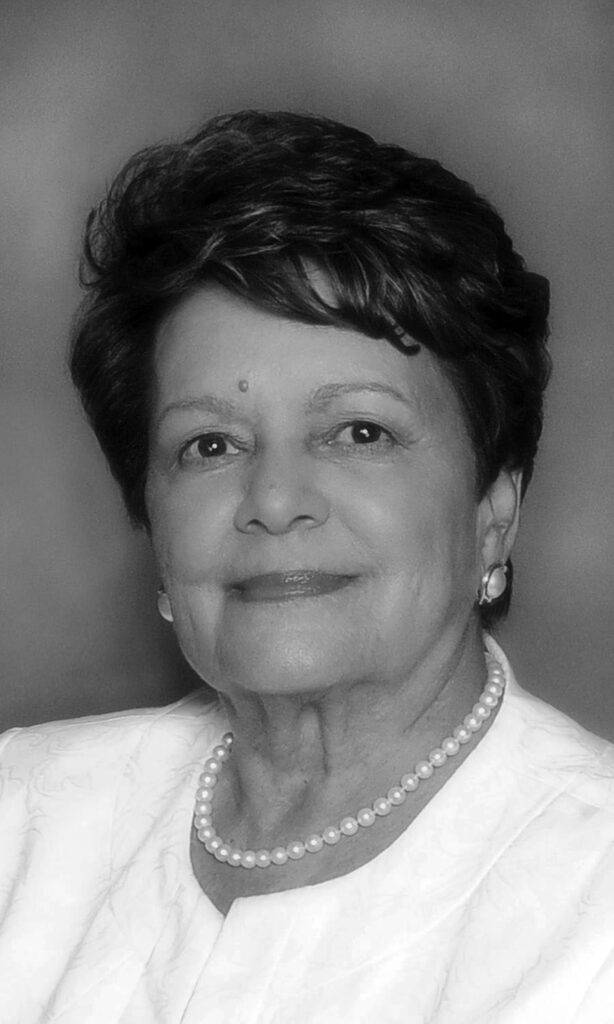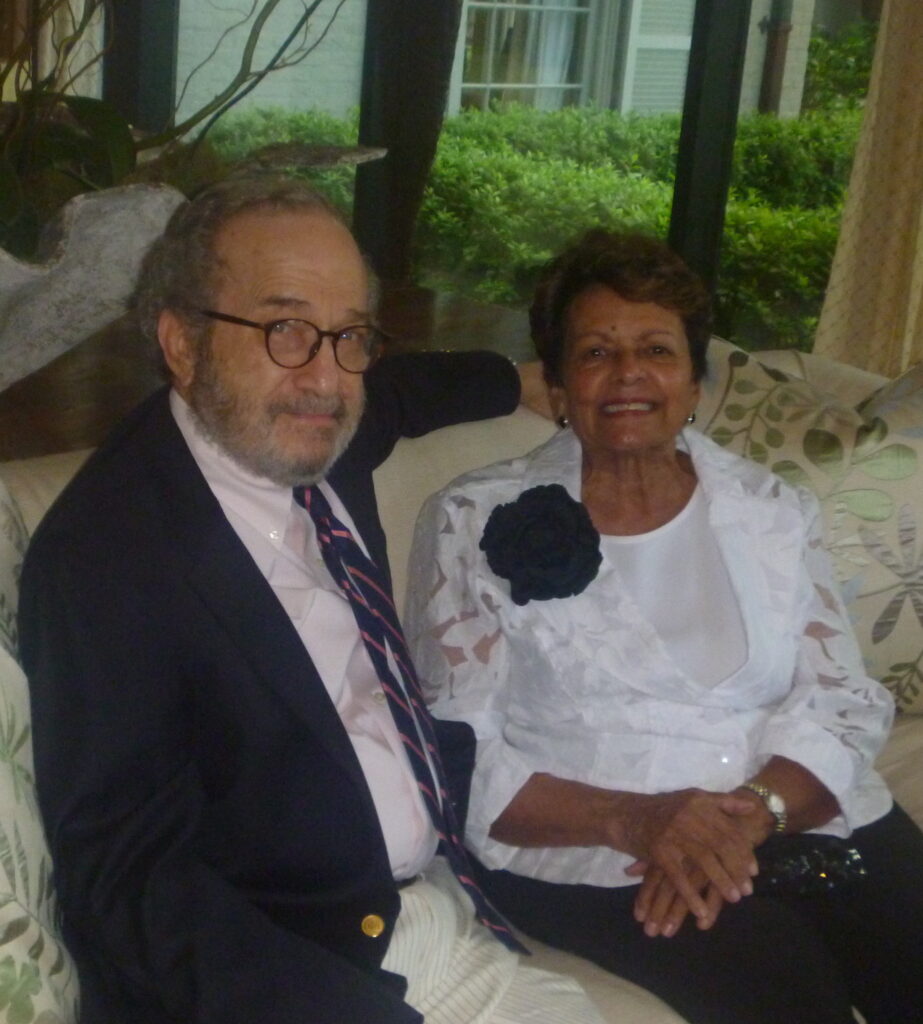Remembering Sybil Morial
1932 – 2024
We must be free not because we claim freedom, but because we practice it.
—William Faulkner
 Author of the groundbreaking book: Witness to Change,
Author of the groundbreaking book: Witness to Change,
catalyst for social justice, and
beloved member and patron of the Faulkner Society.
Sybil Haydel Morial, former First Lady of New Orleans, was the matriarch of a family synonymous with social progress in Louisiana.
The title of her memoir notwithstanding,
Sybil Morial was far more than just a Witness to Change.
Widow of the city’s first black mayor, Ernest “Dutch” Morial, and mother of
Marc Morial—also a mayor and currently head the National Urban League—Sybil
was a dedicated catalyst for change in her own right.
We must be free not because we claim freedom, but because we practice it.
—William Faulkner

Joseph DeSalvo, Co-Founder of the Pirate’s Alley Faulkner Social and Sybil Morial,
both born in 1932, exchange memories of the changes
they witnessed at a Society fundraiser at the home of David Monteleone.
Sybil Haydel Morial, former First Lady of New Orleans, was the matriarch of a family synonymous with social progress in Louisiana. The title of her memoir notwithstanding, Sybil Morial was far more than just a Witness to Change. Widow of the city’s first black mayor, Ernest “Dutch” Morial, and mother of Marc Morial, also a mayor and currently head the National Urban League—Sybil was a dedicated catalyst for change in her own right.
Sybil and Dutch first got to know each other during a passionate conversation about the
Brown vs. Board of Education decision. A graduate of Boston University, where she first met Martin Luther King, Jr., Sybil decided to test the court’s decision by applying to Tulane for graduate school. She was kicked out after only a few classes, despite her academic prowess, because of her race. It would be another nine years before Tulane admitted any African American students to a graduate program. Though perhaps best known as the wife and mother of the Morial Mayors, Sybil quietly began her own Civil Rights journey in the 1950s registering African American voters, after she was banned from the League of Women Voters, and successfully challenging a statute that banned public school teachers in New Orleans from being politically active, particularly as members of the NAACP. She worked to improve the quality of education and healthcare for minorities. When the Louisiana World Exposition announced it was coming to New Orleans in 1984, believing that a Black presence was imperative in a city with a majority Black population, Sybil, initiated and led the creation and funding of the Afro-American Pavilion which presented the contributions of African Americans to their country and ours. It was one of the very most popular venues at the fair.
In 1987, while Associate Dean at Xavier University, she was executive producer of the nationally acclaimed film, A House Divided, narrated by James Earl Jones and documenting desegregation in New Orleans. She became an active member of the Urban League of Greater New Orleans and, eventually, the League of Women Voters. She also helped found the Louisiana League of Good Government, a non-partisan, interracial women’s organization devoted to civil liberties and full participation in government for all Louisiana citizens. She was the recipient of many awards for her activism, including the Torch of Liberty Award of the Anti Defamation League of B’nai Brith, the Martin Luther King Lifetime Achievement Award, the Whitney M. Young Brotherhood Award, and the National Council of Jewish Women’s Hannah Solomon Award.
Through it all Sybil maintained a career in education, earlier as a classroom teacher in Newton, MA, Baltimore, MD, and New Orleans for 13 years and for 28 years as an administrator at Xavier University of Louisiana where she was Associate Dean of the Drexel Center, Vice President of Public Affairs and Communications, and Vice President of External Affairs. And she was a role model of motherhood for her children: Marc Morial, Dr Julie Morial, Jaques Morial, Cheri Morial Asbury & Monique Morial.
In the wake of a string of race-based hate crimes and police shootings more than a decade ago—a time when the hard-fought battles of the Civil Rights era were all resurfacing viciously—it seemed appropriate to Sybil to chronicle her history of all that she had witnessed and endured as a Negro women in America. The Faulkner Society assisted her as she created  the narrative of her memoir. When the first draft of Witness to Change: From Jim Crow to Political Empowerment was completed in 2013, Sybil entered it in the Faulkner Society’s Faulkner –Wisdom Creative Writing Competition and this early draft placed as First Runner-up in the Non-Fiction Book category. New York literary agent Jeff Kleinman, who judged non-fiction that year, has this to say:
the narrative of her memoir. When the first draft of Witness to Change: From Jim Crow to Political Empowerment was completed in 2013, Sybil entered it in the Faulkner Society’s Faulkner –Wisdom Creative Writing Competition and this early draft placed as First Runner-up in the Non-Fiction Book category. New York literary agent Jeff Kleinman, who judged non-fiction that year, has this to say:
This memoir is not just a memoir. It’s a personal history, you might say, though the word personal is kind of a misnomer, because the personal is very public in this case. The author tells the story of a black family’s life in New Orleans during the era of Jim Crow laws. It’s one thing to know of the laws, but it’s another to see them from the pragmatic view of a black family experiencing them, to see how they affected their lives in a quotidian but consequential way. These two words – quotidian and consequential – are hardly ever put together, and I think this is why the manuscript works: it does a good job of handling the moments in which the family experiences the laws. It is neither melodramatic nor willfully removed. These moments are handled deftly. The narrator telling us this personal story is a voice worth following.
When the final draft of the book subsequently was published by Blair, all of the independent booksellers joined hands to help her launch it during a gala celebration at the New Orleans Museum of Art for 250 people. While the books is a decade old, it’s message is
au courant. The political world today again is explosive with hate and divisiveness, lies
and greed, and deliberate strategies to gain power with laws to suppress the vote, take away the rights of women to determine their own health care, ban some of the finest literature of the Western World, and help the One Per Cent get richer and richer and richer at the expense of the other 99 per cent of Americans. Witness to Change, a story told with the grace and dignity and charm and steel that were the epitome of the author’s spirit, is well worth a read today. The book meets the goal she had in mind. It reminds us that through hard work and dedication, one person can inspire change in her own community, as Sybi
Above all, I hope it will empower African-Americans and women.
Members of the Pirate’s Alley Faulkner Society, Inc. are proud to have had her as a member, patron, and active participant. The Society awarded an ALIHOT (A Legend In His/Her Own Time) medal to her for courage in literature. She spread light and hope and truth and captivated all who knew her well with her sense of humor and her gentle and good-mannered way of getting things done. Her passing leaves an enormous hole in the collective conscience of New Orleanians.
In memory of Sybil, we each should examine our individual conscience and as
Michelle O’Bama said recently:
Do Something!